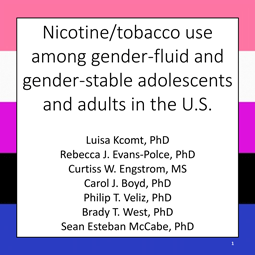“Trajectories of tobacco use, stress and health among U.S. transgender youth and adults” with Dr. Luisa Kcomt (Wayne State University)
- Contact the presenter
- Dr. Luisa Kcomt <kcomt@wayne.edu>
- View Abstract +
- INTRODUCTION: Prior work has shown that nicotine/tobacco use is more prevalent among transgender populations (individuals whose gender identity differs from their assigned sex at birth) relative to cisgender populations (i.e., non-transgender individuals). There remains a paucity of information on gender-fluid individuals (i.e., persons who experience changes in their gender identity over time) and nicotine/tobacco use. We aimed to estimate the prevalence of nicotine/tobacco use among U.S. adolescents and adults who are fluid versus stable in their gender identities. METHODS: We fit multivariable logistic regression models to data from Waves 2 to 4 (2014/15 to 2016/18) of the Population Assessment of Tobacco and Health (PATH) Study (N = 33,197 U.S. individuals aged 14 years and older). We examined associations of gender stability/fluidity over three waves with nicotine/tobacco use at wave 4. Differences in any past 30-day tobacco, cigarette, e-cigarette, other tobacco, and poly-tobacco use were assessed among cisgender-stable, transgender-stable, and gender-fluid participants. All models adjusted for sex, age, race/ethnicity, geographic region, sexual stability/fluidity, and past-year psychological distress. RESULTS: An estimated 1.0% of adolescents and adults were classified as gender-fluid. Prevalence of any past 30-day tobacco use was higher among gender-fluid individuals (42.7%) than among gender-stable individuals (transgender-stable, 37.8% and cisgender-stable, 26.7%). Evidence suggests that gender-fluid participants had significant increased odds of any past 30-day tobacco use (adjusted odds ratio [AOR] = 2.0, 95% confidence interval [CI] = 1.3, 3.0), cigarette use (AOR = 1.7, 95% CI = 1.1, 2.5), e-cigarette use (AOR = 2.2, 95% CI = 1.4, 3.5), other tobacco use (AOR = 2.2, 95% CI = 1.4, 3.4), and poly-tobacco use (AOR = 2.0, 95% CI = 1.3, 3.1) compared with cisgender-stable individuals. CONCLUSIONS: Gender-fluid individuals are at higher risk for nicotine/tobacco use, placing them at greater risk for tobacco-related health consequences. Healthcare providers and tobacco cessation specialists should develop an awareness of gender diversity and understand changes over time to create a welcoming, inclusive environment for individuals who do not subscribe to a fixed, binary conceptualization of gender. PUBLICATIONS: Dr. Kcomt was the lead author of an article resulting from her pilot project work. The article, published in Nicotine & Tobacco Research, is entitled “Tobacco Use among Gender-Varying and Gender-Stable Adolescents and Adults Living in the U.S.”.
- View Bio +
- Dr. Luisa Kcomt is an Assistant Professor at Wayne State University’s School of Social Work. She received her Ph.D. from the University of Windsor in 2019. Following her doctoral studies, she was a post-doctoral research fellow at the University of Michigan’s Center for the Study of Drugs, Alcohol, Smoking and Health. Dr. Kcomt has worked as a social worker in various clinical settings including hospital, outpatient behavioral health, and hospice and palliative care. Her research agenda is motivated by over 20 years of clinical and leadership experience, and centers on substance use, health disparities, and healthcare access among sexual, gender, and racial/ethnic minority populations. Using a social justice lens, her goal is to advance health equity and promote the health and well-being of vulnerable populations. Dr. Kcomt is an Asian American woman and a first-generation college graduate. She has lived in four countries (Peru, Commonwealth of the Bahamas, Canada, and the United States) across two continents to date. Her lived experience as an immigrant has fostered a social consciousness and empathy for marginalized and vulnerable populations. She is a Licensed Master of Social Work in the state of Michigan. Dr. Kcomt’s profile at Wayne State University.
 Dr. Luisa KcomtWayne State University
Dr. Luisa KcomtWayne State University
